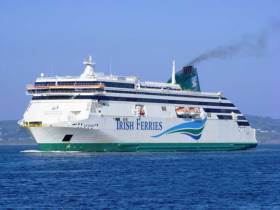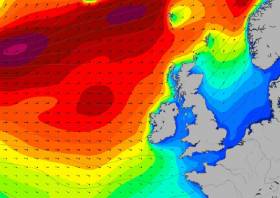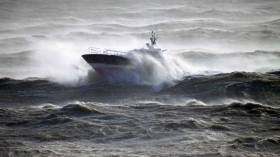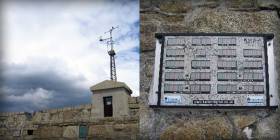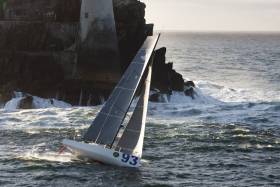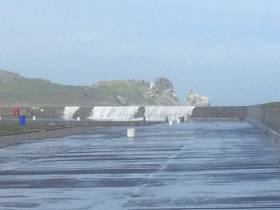Displaying items by tag: Weather
Stormy Irish Sea Forecast Prompts Ferry Cancellations
#IrishSea - “Averse conditions in the Irish Sea” have prompted the cancellation of six Irish Ferries sailings between Dublin and Holyhead tomorrow (Friday 23 December), as The Irish Times reports.
Passengers scheduled to travel from Dublin on the 8.45am and 10.45am ferries are advised to catch the 8.05am departure instead, while afternoon travellers are asked to make their trip later on the 8.05pm or 8.55pm sailing.
Those coming from Holyhead at 11.50am, meanwhile, will be accommodated on the next sailing some two hours later, though late afternoon travellers will have to wait till the early hours of Saturday morning (24 December).
The cancellations come as Storm Barbara sweeps in from the North Atlantic across the north of Scotland, bringing with it a high risk of stormy weather conditions in the coastal counties of Connacht and Ulster.
Yellow Warning For Small Craft As Storm Barbara Approaches
#Weather - Met Éireann has announced a Status Yellow small craft warning for strong gales in effect today (Wednesday 21 December) ahead of Storm Barbara’s expected arrival at the weekend.
Southwest winds will reach Force 8 at times this evening and tonight on coasts from Slyne Head to Rossan Point to Fair Head.
That’s before the deep Atlantic depression, the second winter storm of the current season, tracks eastwards well to the north of Scotland, bringing wet and windy weather across Ireland — and the risk of stormy conditions in the coastal counties of Connacht and Ulster.
Achill Island Coast Guard advises mariners and residents in these areas to expect at least an Status Orange weather warning this Friday, as the projected Force 10 winds are forecast to last up to 24 hours, according to the Connacht Telegraph.
Sea Levels Around Ireland Rise by 3cm Per Decade
#RisingSeaLevels - Rising sea levels around Ireland due to climate change are almost 7cm since the early 1990s.
The Irish Examiner writes that this is due to the rising temperature of the planet, greenhouse gas emissions (GHGs) and the melting of glaciers.
And the next five to 15 years is a crucial time period within which to act if we want to halt any permanent changes to the planet.
According to the Environmental Protection Agency (EPA), climate change is most obvious in our changing sea levels.
The newspaper also writes that the number of high quality rivers has halved.
“Observed climate change impacts are most evident in the global temperature record, sea-level rise, loss of glaciers and ice sheets and changes in the nature and intensification of precipitation events,” the EPA report states.
“Since 1993, average sea level has risen around Ireland by just over 3cm per decade,” the report reads.
For further coverage the newspaper has more here
New Location For Dun Laoghaire Harbour Weather Station
#Weather - The Dun Laoghaire Harbour Company advises of a new location for the harbour's weather station, which had been inactive since 6 June this year.
Live weather data can now again be found on www.dlhweather.com (times given in GMT).
'Tough & Challenging Round Ireland Race Ahead', Says Sailing Forecaster Mike Broughton
Specialist sailing weather forecaster Mike Broughton of winningwind.com says tomorrow's Round Ireland Race will be a tough and challenging one
‘Looks like we have light sea breezes for the start in fine and sunny conditions – but it’s all going to change.
For start time we have a ridge of high pressure over Wicklow bringing a light sea breeze that will veer to south westerly winds increasing 12-17 knots by early evening, giving a beat south towards Tuskar Rock. Then we have unsettled conditions from midnight as the first of possibly seven fronts to pass the fleet over the next four days. The first warm front will bring light rain and SW winds of 9-15 knots – still giving a beat along the south coast.
By Sunday afternoon, we have a complex, mid Atlantic low pressure system that will dominate the weather from Sunday to Tuesday, bringing several fronts, with rain and winds to gale force mainly from the south west to west-south-west. It looks like a tough and challenging beat on Sunday afternoon/evening around the Fastnet area, particularly for the smaller boats. We can expect winds to 40 knots and seas 3.5 to 4.0 metres.
The low pressure looks to deepen through Sunday and by midnight is forecast to be 300 miles south of Iceland and will then start to slowly fill. Leaving most of the fleet in WSW winds along the west coast on Monday morning, giving fast reaching conditions north, still in waves around 3.5 metres. Winds for Monday afternoon to Tuesday evening still look to be strong (mainly 24-34 knots) from the WSW and giving fast broad reaching conditions across the north coast. Whilst winds on the NE coast will be lighter in the lee of the mainland. Winds east of Dublin will be down to 10 knots by Thursday – mainly from WSW to SW.
Overall, it looks like a tough and challenging race, with plenty of opportunities to make gains from the predictable shifts from passing fronts. Rough seas close to the Fastnet and all along the west coast.
Best of luck to my many friends out there doing the race – it will be one to remember!
Howth Coast Guard Warns Walkers Over Waves On East Pier
#WaterSafety - Howth Coast Guard has advised walkers to avoid the harbour's East Pier today (Sunday 10 April) due to the danger of breaking waves.
It comes as Met Éireann issues a Status Yellow weather warning for most of the country over strong winds, heavy rainfall and high spring tides with the moon at perigee.
Cork is the worst hit by the current deluge with many parts of the city hit by flooding this morning, as The Irish Times reports.
Gale warnings and small craft warnings are currently in effect around the coast, as easterly gales are expected to surpass Force 6 from Erris Head to Fair Head to Wicklow Head.
Coast Guard unit at scene. More reports coming in of other coastal areas being exposed to waves breaking endangering the...
Posted by Howth Coast Guard on Sunday, 10 April 2016
Northern Lights Shimmer Over Belfast & Lough Neagh
#Aurora - Skywatchers in Northern Ireland were treated to a spectacular light show last night (Monday 7 March) as a "lucky combination" of weather conditions made the aurora borealis visible across much of the country.
The video below, via Tam Mullen and the Belfast Telegraph, shows how the Northern Lights looked over Belfast and Lough Neagh.
St Michael's Head of the River Cancelled
#Rowing: The St Michael’s Head of the River, due to be held on Saturday, February 20th, has been cancelled. The club announced that “due to the recent severe weather we have to announce the cancellation of this years’ Head of the River event at O’Briensbridge, County Clare. We hope to stage the event on an alternative date this year. We apologise for this cancellation. However weather conditions has made the staging of the event on February 20th unsafe."
Storm Imogen Prompts Severe Wind Warning From Midnight Tonight
#StormImogen - Met Éireann has issued a Status Orange alert for all coastal areas from midnight tonight (Sunday 7 February) as Storm Imogen sweeps in.
The warning is already in effect for mariners in all Irish coastal waters and the Irish Sea with south-west to west games or strong gales expected, reaching storm force over night from Carnsore Point to Mizen Head to Slyne Head.
Cork and Kerry are expected to bear the brunt of this latest Atlantic depression, with mean wind speeds between 65 and 75kmh and gusts of up to 120kmh.
A Status Yellow wind warning has been declared for Clare, Limerick and Waterford active from 2am tonight, with mean wind speeds and gusts only slightly less severe.
And nationwide there is a Status Yellow weather advisory in place from midnight, with "extreme waves" between 12 and 15m predicted along the South West and West Coasts.
It follows a blustery fortnight that began with Storm Jonas – which brought much of the north-eastern US to a standstill with heavy snowfall and blizzards – buzzing north-west of Britain and Ireland, followed quickly by Storm Gertrude and most recently Storm Henry.
Neptune Head Cancelled
#Rowing: The Neptune Head of the River at Blessington had to be cancelled this morning because of bad weather. The organisers had been ready to go ahead but conditions were not rowable. This is a double blow for the event, as it had originally been fixed for November and had to be called off because of a bad weather forecast.


























